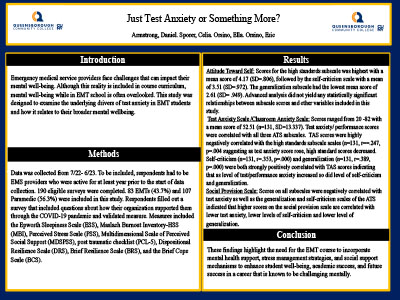ABSTRACTS
Just Test Anxiety or Something Larger?Author: Daniel Armstrong, Celia Sporer, Ella Orsino, and Eric Orisino | | Associate Authors:
Introduction: Emergency medical services (EMS) providers face challenges that can impact their mental well-being. Although this reality is included in course curricula, mental well-being while in EMT school is often overlooked. Objective: To examine the underlying drivers of test anxiety in EMT students and how it relates to their broader mental well-being. Methods: The sample included 140 students enrolled in five EMT courses. Surveys were administered and students were allotted time to complete them. The survey included multiple preestablished validated measures, including the Attitude Toward Self (ATS) instrument, the Test Anxiety Scale (TAS)/Classroom Anxiety Scale (CAS), and the Social Provision Scale. Results: ATS: Scores for the high standards subscale were highest, with a mean score of 4.17 (SD = 0.806), followed by the self-criticism scale, with a mean score of 3.51 (SD = 0.972). The generalization subscale had the lowest mean score of 2.61 (SD = 0.949). Advanced analysis did not yield any statistically significant relationships between subscale scores and other variables included in this study. Test Anxiety Scale/Classroom Anxiety Scale: Scores ranged from 20–82, with a mean score of 52.51 (n = 131, SD = 13.337). Test anxiety/performance scores were correlated with all three ATS subscales. TAS scores were highly negatively correlated with the high standards subscale scales (n = 131, r = −0.247, p = .004), suggesting that as test anxiety scores rose, high standard scores decreased. Self-criticism (n = 131, r = 0.353, p = .000) and generalization (n = 131, r = 0.389, p = .000) were both strongly positively correlated with TAS scores, indicating that as level of test/performance anxiety increased, so did level of self-criticism and generalization. Social Provision Scale: Scores on all subscales were negatively correlated with test anxiety as well as the generalization and self-criticism scales of the ATS, indicating that higher scores on the Social Provision Scale are correlated with lower test anxiety, lower levels of self-criticism, and lower level of generalization. Conclusion: These findings highlight the need for EMT courses to incorporate mental health support, stress management strategies, and social support mechanisms to enhance student well-being, academic success, and future success in a career that is known to be challenging mentally.
|

